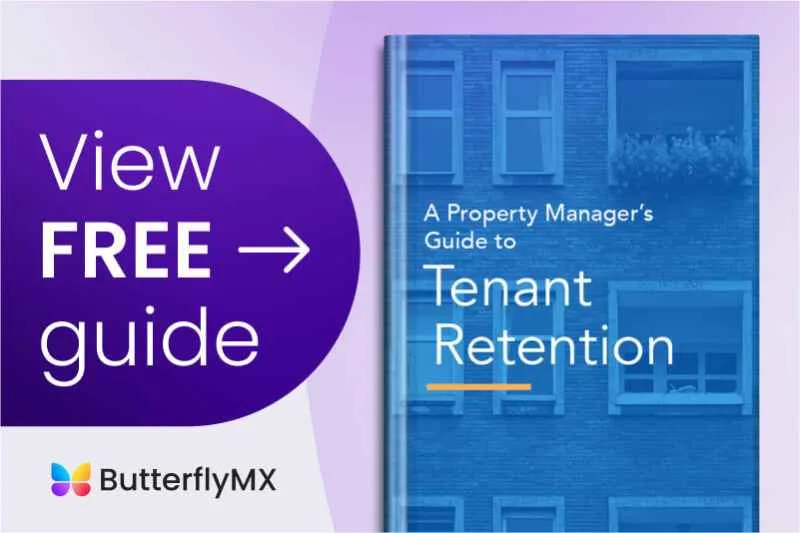Key takeaways
- Tenant retention rates are an important measurement in real estate and property management.
- Tenant retention is important because it saves money and indicates that your property management is effective.
- The five keys to tenant retention are boosting response times, automating your services, improving tenant screening practices, making beneficial compromises, and offering renewal incentives.
- The disadvantages of retaining tenants include fewer rent increases and the possibility of being stuck with lackluster tenants.

There are many things to consider in property management, though none are as crucial as tenant retention and preventing unnecessary tenant turnover. Moreover, maintaining a comfortable atmosphere for your tenants should be a top priority.
The most important indicator that you’re doing well is your resident retention rate. If you feel your retention rates could be better, continue reading to learn the best ways to encourage lease renewals at your property.
In this post, you’ll find:
- Why is tenant retention important?
- 5 tenant retention ideas
- What are the disadvantages of tenant retention?
Why is tenant retention important?
Tenant retention is important because it’s cheaper to renew a lease than to sign on new tenants. Furthermore, it can be a positive mark that your property management is good enough to make people want to stay.
Additionally, by maintaining high rental occupancy rates, you’re on the fast track to increasing profits and maximizing your property’s net-operating-income (NOI).
How do you calculate tenant retention rates?
Before constructing a retention strategy, you first need to understand your current tenant retention rate. So, how do you calculate tenant retention rates?
To calculate retention rates:
- First, find the total rental occupancy numbers for the beginning of a period.
- Then, find the total rental occupancy numbers for the end of that same period.
- Now, divide the second total by the first.
- Last, multiply that number by 100 to get your estimated retention rate.
It’s a quick and easy process that will also help you figure out your overall tenant turnover rate and how you can improve it.
Learn more about tenant retention:
5 tenant retention ideas
Now that you know how to calculate your retention rates, let’s discuss some ideas to help you establish a solid tenant retention plan.
In this section, you’ll discover the following actions you can take to increase retention rates:
- Boost response times
- Automate your services
- Improve tenant screenings
- Be quick to make compromises
- Offer lease renewal incentives
1. Boost response times
Have you ever sent an email just to wait around for an answer you desperately need? What’s worse is never getting a response at all.
That’s why everyone should increase the rate of their response to current and prospective tenants. Moreover, increasing the response rate makes your tenant feel valued and will have a greater impact on your tenant-manager relationship.
Aside from responding to tenant inquiries, you can also maintain updates through monthly or weekly apartment newsletters. Even if it doesn’t seem like people are reading them, you can rest assured that tenants will find them informative.
2. Automate your services
Staff and labor shortages tend to come in cycles, which can often leave in-house staff overwhelmed. This can lead to hiccups in task completion, such as rent collection and maintenance requests — further leading tenants to reconsider renewing their leases.
One of the best ways to circumvent these issues during staff shortages is to automate some of your services.
Services that may benefit from automation:
- Rent collection
- Access control
- Maintenance requests
- Screening services
3. Improve tenant screening
Many rental properties are automating their day-to-day operations, including tenant screenings. When trying to sign on reliable tenants, screening for background information is a must.
However, it’s important to also have a human touch in the screening process by designating someone to give a once-over on the screened applications. If you rely solely on automated screening software, you’ll likely lose out on good tenants because of faulty or outdated background information.
For a more well-rounded process, communicate with applicants to get a better picture of their past rental history.
4. Be quick to make compromises
Compromise in the business world can come across as a weak gesture when in reality, it’s a sign of assurance and flexibility. However, the word can also feel abstract, so allow us to elaborate.
Examples of potential compromise:
- Rent increases: Inflation and hikes in cost-of-living are a harsh reality. When your rates increase, it’s tempting also to increase rent. While that can have the desired effect when taking in new renters, it can also have an adverse effect when trying to get a renewal on someone’s lease.
- Pet policies: Do you have a tenant that always pays their rent on time, takes care of their unit, and always communicates with you? It could be worth making a compromise on your pet policy if asked. For instance, if someone wants a dog that’s 5 to10 pounds over your policy, it may benefit you to allow the compromise.
- Deposit amounts: Perhaps you have a prospective tenant with great reports and glowing references, but they can’t manage the full deposit. You’ll need to decide if sticking with a strict deposit is worth missing out on a promising tenant.
Learn more about common resident complaints and possible solutions:
5. Offer lease renewal incentives
One of the best ways to keep residents happy is to offer up some lease renewal incentives. These don’t have to be extravagant, but simple goodwill gestures can go a long way.
Renewal incentives:
- Offer a month’s rent-free or discounted
- Gift an upgraded appliance
- Offer free carpet cleaning
- Host on-site events or food stations
- Consider unit upgrades for star tenants
- Give a discounted benefits package
Renewal incentives will largely depend on budget, tenant performance, and what is on hand at the time. Additionally, remember any promises you make as tenants will expect you to uphold your end of a renewal agreement.
What are the disadvantages of retention?
We’ve discussed the pros of retaining tenants, but are there any disadvantages to retaining long-term tenants?
The answer is complicated and depends on certain factors.
For instance, you’re less likely to be able to increase rent over time if you retain too many tenants. Also, you could be stuck with some tenants that don’t benefit your property either because of late rent, bad practices, or lack of respect for their neighbors.

Get your free quote!
Fill in the form below, and we'll email you right back.
Want a free quote?
Fill in the form below, and we'll email you right back.
You’ll be redirected shortly...






